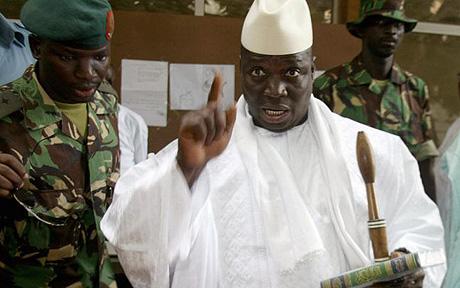LGBTI news 2: Iran, Morocco, ISIS, Kenya, Gambia, Uganda
Colin Stewart is a 45-year journalism veteran living in Southern…
News briefs about countries with anti-gay laws or considering anti-gay legislation, excerpted with slight modifications from UNAIDS’s Equal Eyes recap of the world’s LGBTI-related news. (This is the second of three posts. The first one reported news from Kazakhstan, Sri Lanka, Malaysia and Brunei. The third will report news from Jamaica, Russia and Ukraine.)
NORTH AFRICA / MIDDLE EAST

The Vatican Ambassador to Iran, Bishop Leo Boccardi, met with Shiitte Scholar Ayatollah Hosseini Boushehri seeking an interfaith response to gay marriage and a dialogue to address “problems of this sort.”
Iranian immigrant Tooji, Norway’s representative in Europe’s 60th Eurovision Song Contest, was banned from returning to Iran after speaking out on human rights abuses and LGBTI persecution.
Two French lesbian activists in Morocco were expelled from the country for kissing in a pro-gay protest and two men were arrested for violating “public modesty” by standing too close. Mohsine and Lahcen were touring and taking pictures near Hassan tower, the capital’s famous minaret, earlier in June when they were arrested by the police for supposedly standing too close to each other, activists said. Maroc Hebdo magazine asked on its cover: “Should we burn gays?”
In Iraq, ISIS continues to murder men accused of being gay, this time dropping three men from a roof and posting the pictures online.
AFRICA

In Kenya, Member of Parliament Irungu Kangata demanded the Judiciary explain donations from the UNDP and the Ford Foundation, organizations that “openly support gay rights.” He suggests the donations influenced the Court’s recent pro-gay ruling.
Kangata wants Chief Justice Willy Mutunga and Chief Registrar Anne Amadi to explain what Sh87 million (US $883,000) from the United Nations Development Program and a further Sh80 million (US $812,000) from the Ford Foundation was meant for.
The Sh167 million was allocated for “capacity building” for the Judicial Service Commission, with an extra Sh2 billion from the National Treasury set aside for the expansion of magistrates courts.
Kangata also challenged the Judiciary about a seminar organized by Ford Foundation and attended by a number of judges days before the High Court ruled that the Registrar of Societies should allow the registration of LGBT rights organizations.
“I want the Judiciary to come clean on this seminar and tell us the agenda… and who attended it. I am posing questions… so that (those of) us who are litigants in the appeal against the ruling can ask the said judges to disqualify themselves.”
***

The European Union was ‘astonished’ when EU representative Agnes Guillaud was expelled from Gambia without explanation, said a spokeswoman. Guillaud had 72 hours to leave the country. The EU has been critical of The Gambia’s human rights record, particularly regarding its laws penalising homosexuality. Last year the EU blocked nearly $15m in aid to Gambia.
President Yahya Jammeh has governed the small west African nation with a firm hand since he came to power in a coup 20 years ago. He has crushed dissent and faces mounting international criticism over issues ranging from human rights to his stated belief that he can cure Aids. The president has also implemented tough measures against Gambia’s lesbian, gay, bisexual and transgender community. He has called gay people “vermin” and has threatened to slit their throats.
The EU summoned the Gambian ambassador to seek an explanation for the expulsion, officials said.
***
 In what’s being celebrated as a monumental moment of visibility for Uganda’s beleaguered LGBT community, one of the nation’s leading LGBT activists graces this week’s cover of Time magazine’s Europe edition. Kasha Jacqueline Nabagesera, an out lesbian and co-founder and editor of Uganda’s first LGBT publication, Bombastic, tells The Advocate she hopes the cover will not only bring awareness to the plight of LGBT Ugandans, but help people around the world realize that LGBT people are their friends, neighbors, and family members.“Now many people will know about the struggles LGBT people go through in Africa and the world over. They will realize that the people they hate most are actually the people they love most when they get to read the article. They could be hating on their beloved family and friend without knowing they are LGBT,” Nabagesera said.
In what’s being celebrated as a monumental moment of visibility for Uganda’s beleaguered LGBT community, one of the nation’s leading LGBT activists graces this week’s cover of Time magazine’s Europe edition. Kasha Jacqueline Nabagesera, an out lesbian and co-founder and editor of Uganda’s first LGBT publication, Bombastic, tells The Advocate she hopes the cover will not only bring awareness to the plight of LGBT Ugandans, but help people around the world realize that LGBT people are their friends, neighbors, and family members.“Now many people will know about the struggles LGBT people go through in Africa and the world over. They will realize that the people they hate most are actually the people they love most when they get to read the article. They could be hating on their beloved family and friend without knowing they are LGBT,” Nabagesera said.
For more information, read the full edition of Equal Eyes.


